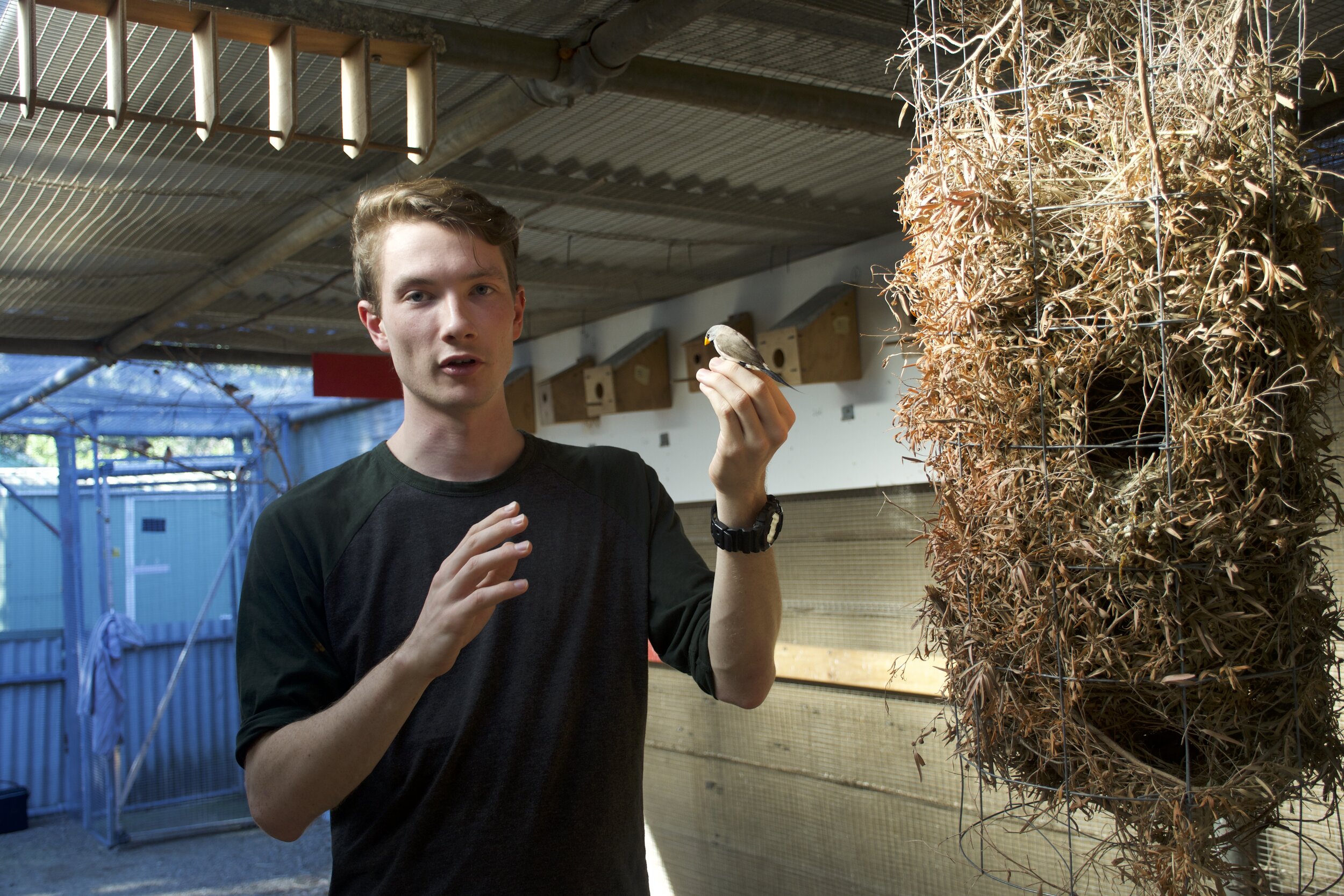Daniel M. Hooper
I am currently a Gerstner Postdoctoral Scholar in Bioinformatics and Computational Biology at the American Museum of Natural History in New York City. I study evolutionary conflict associated with the divergence and emergence of species, integrating insights from a combination of laboratory, field, and genomic approaches. My research focuses on the Australian grassfinches, a charismatic group of songbirds in the family Estrildidae, and on the long-tailed finch hybrid system in particular.
Contact: dhooper@amnh.org
PEOPLE:
Science at its best is a collaborative process. Here are a few of the brilliant people I’m collaborating with:
Rhiannon Schembri
Rhiannon is a PhD student in Simon Griffith's lab at Macquarie University working on genome evolution and speciation in the Australian grassfinches (Poephilinae). Her research is focused on understanding the processes that underpin species divergence and adaptation with an interest in bridging the gap between microevolution and macroevolution in the genomic era. Rhiannon is currently investigating the evolution of hybrid incompatibility and chromosomal inversions in the long-tailed finch, black-throated finch, zebra finch, and other delightful grassfinch species.
Former student mentees:
Amelia-Juliette Demery
Amelia is a former PhD student in Irby J. Lovette's lab at Cornell University and the Cornell Lab of Ornithology. Her research focused on what drives phenotypic variation through both an extrinsinc and intrinsic lens with a specialization in avian bills. Amelia used whole genome sequence data to investigate mutation spectrum evolution in Estrildid finches. Comparing the relative mutation rates from different three-base-pair genomic motifs, Amelia worked to differentiate and describe lineage-specific from genomically-conserved mutational signatures.
Aditya Girish
While an undergraduate at Rutgers University-New Brunswick, Aditya worked with myself and Dr. Brian Smith as an REU student at the American Museum of Natural History. Aditya evaluated support in the family Estrildidae for the compensatory coevolution model of mitonuclear evolution. Using nuclear and mitochondrial genomic data from 26 different species of Estrildid finch, Aditya examined whether nuclear genes that obligately interact with products of the mitochondrial genome evolve at faster rates - and are subject to more frequent bouts of diversifying selection - than elements of the nuclear genome that do not interact with the mitochondrion. Aditya is now preparing a manuscript summarizing his findings. Aditya is currently a PhD student in the computational biology program at Cornell University.
Kelsie Lopez
Kelsie is a currently a PhD student at Harvard University working in the lab of Scott Edwards. Formerly an undergraduate in Biological Sciences with a concentration in Neurobiology and Behavior at Cornell University. Kelsie’s research on mitochondrial divergence between two subspecies of the long-tailed finch led to an honors thesis finding that mitonuclear incompatibilities with the Z chromosome may contribute to reproductive isolation in this hybrid system. This work was published in Evolution. Kelsie is currently focused on examining the genomic divergence between subspecies of the black-throated finch (Poephila cincta) - with an emphasis on population connectivity and genetic diversity in the endangered southern subspecies. Kelsie is broadly interested in behavioral ecology and field research.
Callum McDiarmid
Callum is a former PhD student in Simon C. Griffith’s lab at Macquarie University in Sydney, Australia. Callum’s PhD research used the long-tailed finch system (Poephila acuticauda) to test key predictions of speciation theory, particularly regarding reproductive isolation, as well as investigating sperm ecology and evolution. Callum values an integrative approach using physiology, behaviour, and increasingly genomic approaches to address his questions, collecting the data for his PhD from both from the naturally occurring long-tailed finch hybrid zone in north-western Australia, and from carefully controlled experiments and crosses using captive long-tailed finches.
COLLABORATIVE AFFILIATIONS
Simon Griffith - Macquarie University
Melissah Rowe - Netherlands Institute of Ecology (NIOO)
Frank Chan - University of Groningen
Geoff Hill - Auburn University
Antoine Stier - University of Turku
Molly Przeworski - Columbia University
Brian Smith - American Museum of Natural History





